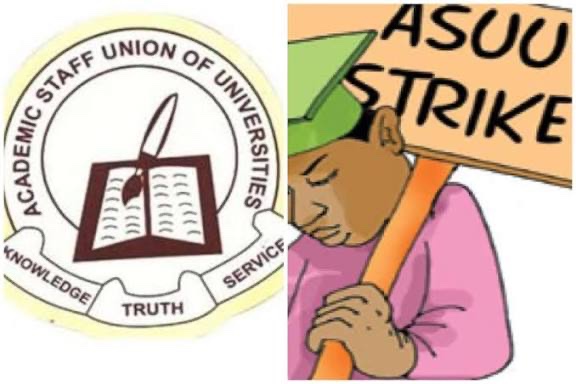
ASUU Declares Two-Week Warning Strike as Deadline Expires, Students Brace for Another Round of Disruption

In a shocking but not entirely unexpected development, the Academic Staff Union of Universities (ASUU) has announced that it will commence a two-week warning strike starting tomorrow following the expiration of the ultimatum it earlier issued to the Federal Government to address its long-standing demands. This decision, confirmed late Sunday evening, has sent waves of anxiety across campuses nationwide, as millions of Nigerian university students brace for yet another period of uncertainty and academic stagnation.
The union’s leadership, after an emergency meeting of its National Executive Council (NEC), declared that the Federal Government had failed to take concrete steps towards fulfilling the agreements reached in previous negotiations. ASUU, in its statement, expressed deep disappointment over what it described as the government’s “habitual insensitivity” and “deliberate neglect” of the education sector. According to the statement, the two-week warning strike is aimed at drawing the government’s attention to the critical state of public universities in Nigeria, which the union insists have been left to rot despite repeated promises and commitments.
Sources close to the union disclosed that the key issues fueling the renewed industrial action include the non-payment of earned academic allowances, the refusal to implement the University Transparency and Accountability Solution (UTAS) as an alternative to the Integrated Personnel and Payroll Information System (IPPIS), as well as poor funding for university infrastructure and research. ASUU has also raised concerns over the federal government’s failure to release revitalization funds that were meant to improve facilities across public universities.
The strike announcement has reignited frustration among students, many of whom have taken to social media to express their anger, sadness, and exhaustion. Hashtags such as #ASUUstrike, #SaveEducation, and #EndAcademicDelay are already trending on X (formerly Twitter), with students sharing memes, emotional pleas, and sarcastic jokes about the state of Nigeria’s education system. For many, the news feels like a painful déjà vu, recalling the eight-month-long strike of 2022 that crippled academic calendars and forced students to remain idle at home for nearly a year.
A student of the University of Benin, who spoke under anonymity, said she was heartbroken by the development. “We just started catching up after the last strike, and now this? It’s frustrating. Some of us have lost interest in schooling. It’s like our futures are being played with,” she lamented. Another student from the University of Ibadan described the announcement as “a cycle of hopelessness,” questioning whether the government truly values education.
Meanwhile, parents and guardians have also expressed outrage, accusing both the Federal Government and ASUU of playing politics with the lives of young Nigerians. The National Parent-Teacher Association of Nigeria (NAPTAN) has called for an immediate intervention to prevent the strike from escalating. In a brief statement, its spokesperson urged both parties to return to the negotiation table, emphasizing that the recurring industrial actions have done irreparable harm to the nation’s academic system.
On the government’s side, officials at the Ministry of Education have reportedly appealed to ASUU to reconsider its decision, citing ongoing efforts to meet some of the union’s demands. However, ASUU insists that it has seen enough empty promises in the past and would no longer tolerate any form of delay or deceit. “We have been patient for too long,” said one senior ASUU official. “We gave them two weeks to show commitment, but nothing was done. Our members are tired of verbal assurances. It’s time for action.”
The strike is expected to affect all federal and most state universities under ASUU’s umbrella, bringing academic activities to a halt. Lectures, examinations, project supervision, and other academic operations will be suspended as members of the union withdraw their services. This comes at a particularly sensitive time, as many universities are in the middle of their semester and had begun preparations for examinations.
The timing of the strike has also sparked speculation about its possible political undertones, especially with ongoing economic challenges in the country. Critics argue that the Federal Government’s focus on economic reforms and political appointments has overshadowed the pressing need to invest in the education sector. Several commentators have warned that the continuous neglect of universities could worsen the brain drain already affecting Nigeria, as lecturers and students continue to seek opportunities abroad.
In an impassioned statement released by the ASUU president, Prof. Emmanuel Osodeke, the union maintained that the strike was not intended to punish students but to save the education sector from total collapse. He emphasized that ASUU’s demands were neither personal nor unreasonable, but centered on ensuring that Nigeria’s universities meet global standards. “We are fighting for the soul of our universities. No serious nation treats education the way Nigeria does. If we do not act now, there may be nothing left to fight for tomorrow,” he stated.
However, some critics have accused ASUU of overusing strikes as a weapon of negotiation, arguing that the method hurts students more than it pressures the government. Education analysts have called for alternative methods of conflict resolution, including arbitration and legislative intervention, to break the cycle of strikes that have plagued the Nigerian university system for decades. According to one policy analyst, “Strikes have become too predictable. Each time the government fails to meet its promises, ASUU resorts to strike. It’s an endless loop that kills productivity and devalues certificates.”
As the countdown to the strike begins, the mood across Nigerian campuses remains tense. Hostels and classrooms that were beginning to buzz with life may once again fall silent. Some students are already packing their belongings to return home, while others cling to hope that the Federal Government might still intervene before midnight. Private universities, unaffected by the strike, have also become a trending topic, with many lamenting that those who can afford them will continue studying while public university students are left behind.
For now, all eyes are on Abuja, where last-minute meetings are reportedly being held between government representatives and some education stakeholders in a desperate attempt to avert the looming shutdown. Whether these discussions will yield any tangible results remains uncertain.
As night falls and Nigerians absorb the news, the looming strike feels like yet another reminder of the fragile state of the nation’s education system—a system caught between unfulfilled promises, inadequate funding, and a tug-of-war between those who teach and those who govern. The two-week warning strike may only be temporary, but its implications run deep, stirring fear that a full-blown strike could follow if the government fails to act swiftly. For millions of Nigerian students, tomorrow may mark not just another day of disrupted learning but another chapter in a long, painful struggle for the right to stable, quality education.


